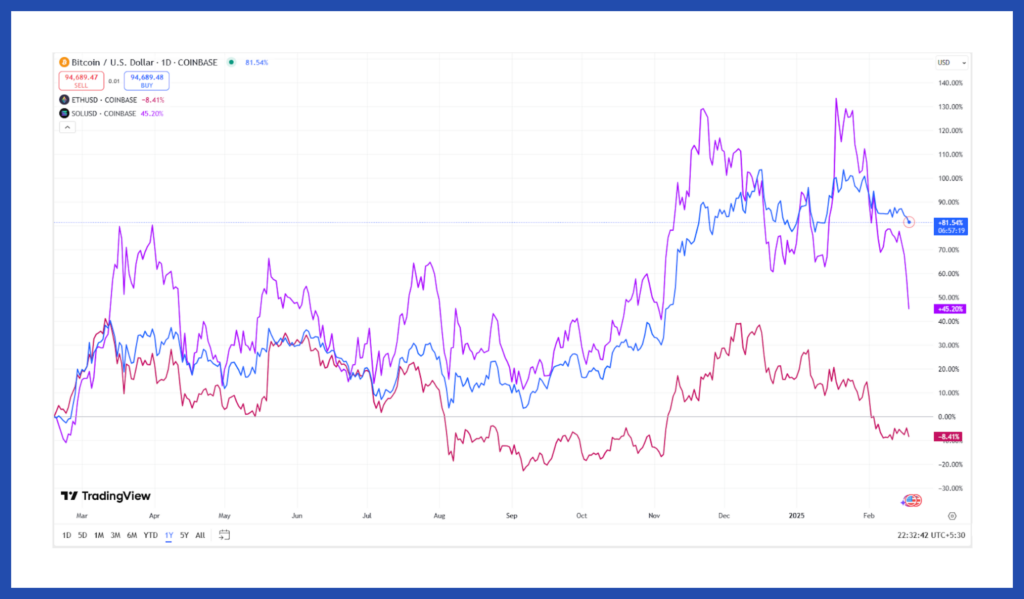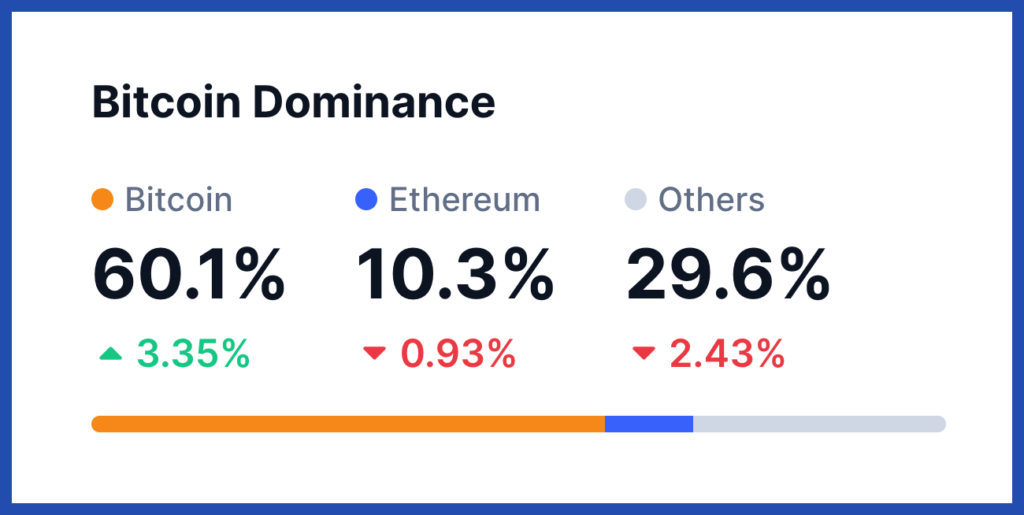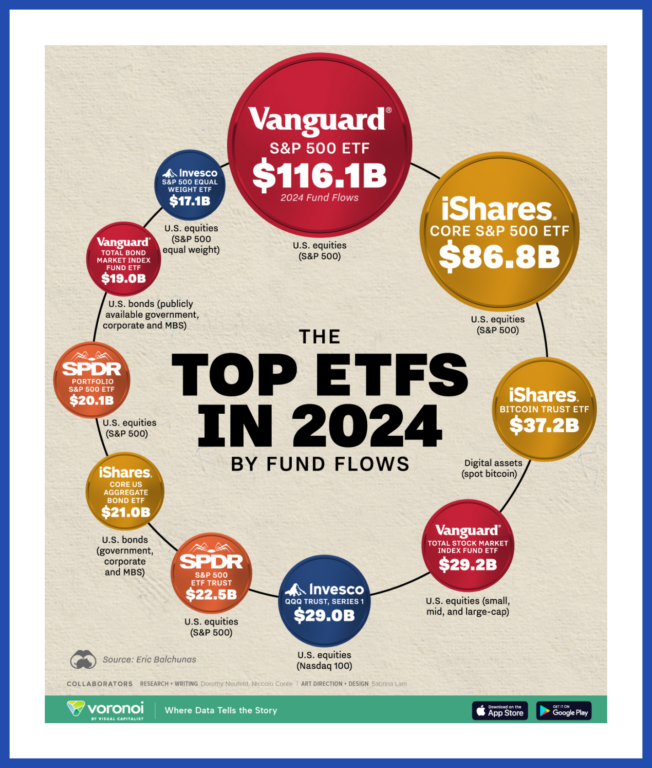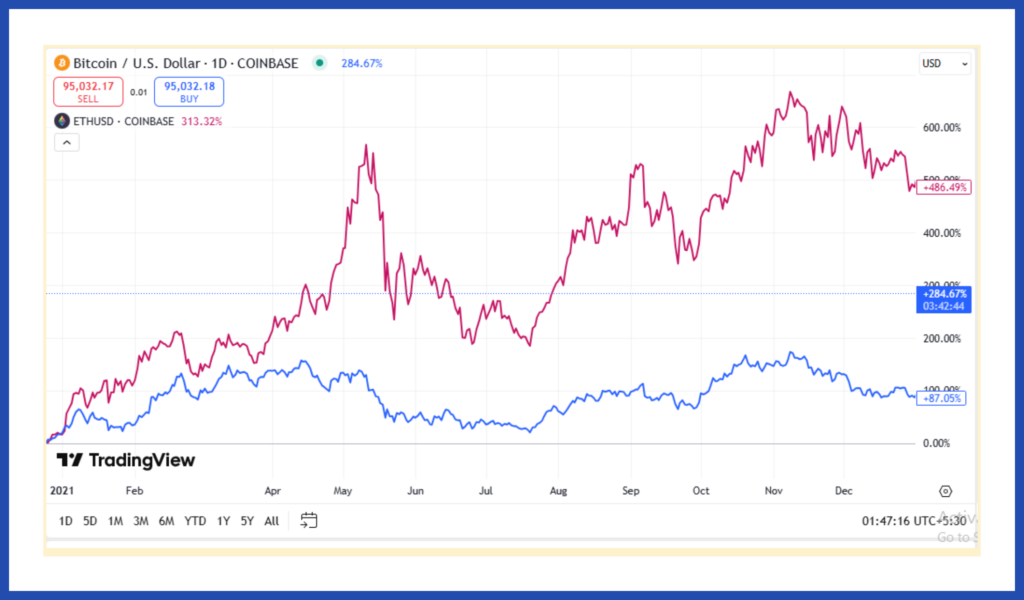Bitcoin or ethereum: which is the best crypto to buy in 2025?
Plus, Trump wants to make crypto great again, Blackrock iShares launches a bitcoin ETF in Canada, and crypto coins to consider during “alt-season.”
Advertisement
Plus, Trump wants to make crypto great again, Blackrock iShares launches a bitcoin ETF in Canada, and crypto coins to consider during “alt-season.”

Welcome to the Canadian Crypto Observer. Financial journalist and author Aditya Nain offers perspective on market-moving headlines to help Canadian investors navigate the cryptocurrency market.
Whether we like it or not, the Canadian crypto market depends heavily on what happens in the U.S. Not long ago—under the Biden administration—the U.S. government was ambivalent about bitcoin and crypto. Leading U.S-based crypto companies like Coinbase and Ripple (creator of the XRP cryptocurrency) faced heavy regulatory headwinds, and innovation in the industry was at a standstill.
However, with President Donald Trump taking office again—and having become a crypto advocate—it seems like the U.S. government is announcing new crypto-focused regulation weekly. Could these moves spur bitcoin (BTC) past $100,000 (all figures in U.S. dollars) again in 2025?
Here are the top five moves that Trump has made with regard to the crypto industry:
Ether (ETH), the native cryptocurrency of the Ethereum platform, has grossly underperformed BTC over the past year, and ETH investors are understandably unhappy. As of Feb. 18, while BTC has risen about 80% over the past year, ETH is down 8%.
It doesn’t help that the Ethereum community has witnessed some online drama, with tussles over leadership changes at the Ethereum Foundation (EF). While Vitalik Buterin, the creator of Ethereum, wants to maintain control of personnel changes at the foundation, he’s facing pressure from those in the community who are unhappy with the current state of affairs. To be sure, EF does not centrally control ETH or its price. However, because it’s an important part of Ethereum’s community, trouble with EF negatively affects investor sentiment and contributes to negative price performance. And there’s another headache: increased ETH short positions by hedge funds betting against the cryptocurrency. Simply put, when you hold a short position on a cryptocurrency (or any other security), you’re adding downward pressure on the price. You’re betting on a fall in the price of the coin.
The pile up in ether shorts soared by a stunning 40% in one week to the highest on record. https://t.co/DL6ixY5JNm pic.twitter.com/5oUE7KmT6Q
— zerohedge (@zerohedge) February 7, 2025
It’s unclear whether ETH’s position as the second-largest cryptocurrency—by market capitalization—is under threat in the medium term. However, as this chart shows, ETH has struggled not just against BTC, but also against its biggest competitor, Solana (SOL).

The chart above shows that while BTC (blue) and SOL (purple) have gained 81% and 45%, respectively, over the past year, ETH (red) has lost over 6%.
Here’s another staggering figure: 42%. That’s how much ETH’s share of the total crypto market has fallen over the past year. In comparison, over the same period, BTC’s dominance has increased by 14.9% and SOL’s by 1.2%.
| Bitcoin (BTC) | Ether (ETH) | Solana (SOL) | |
|---|---|---|---|
| Price change (1-year) | 81.5% | -8.4% | 45.2% |
| Market cap change (1-year) | 83..5% | -8.2% | 41.6% |
| Dominance change (1-year) | 14.9% | -42.3% | 1.2% |
As a result of the 42% decrease in ETH’s dominance, its share of the total crypto market dropped below 10% for the first time since July 2021. As of Feb. 18, it sits at 10.3%.

Here’s how I see it: I’m not ditching Ethereum yet. ETH has largely maintained its position as the second-largest cryptocurrency since before 2017, and the platform has shown itself capable of technological innovation. Further, it has built a large global community of technologists, developers, users and investors. There’s something to be said for longevity and a proven track record, especially in an industry like crypto, where thousands of new projects start and end from one year to the next.
So, while SOL deserves a place in a multi-crypto portfolio, I don’t see it taking ETH’s place just yet. However, ETH is in a precarious position, and possibly at a crossroads. It remains to be seen where it goes from here.
We’ve ranked the best crypto exchanges in Canada.
On Jan. 13, 2025, an institutional behemoth entered the Canadian crypto space.
Blackrock iShares launched iShares Bitcoin ETF (IBIT.TO), a spot bitcoin exchange-traded fund (ETF), listed on CBOE Canada. While spot bitcoin ETFs have been available in Canada for three years, Blackrock’s entry into the Canadian crypto ETF market marks a watershed moment.
Blackrock’s U.S. bitcoin ETF, iShares Bitcoin Trust ETF (IBIT), which IBIT.TO holds, is by far the largest crypto ETF in the world, with assets under management of over USD$57 billion (as of Feb. 18). And it had the third-highest inflows of all ETFs globally in 2024—behind only Vanguard’s S&P 500 ETF (VOO) and Blackrock’s own iShares Core S&P 500 ETF (IVV).

As a global leader in both ETFs and crypto, Blackrock is uniquely positioned to shake things up in the Canadian crypto ETF space. The most obvious illustration of this is that Fidelity reduced the management fee of its Fidelity Advantage Bitcoin ETF (FBTC) to match IBIT’s (from 0.39% to 0.32%) on the day that IBIT started trading in Canada.
Here’s a table of all spot bitcoin ETFs in Canada, with their assets under management (AUM) and management fees:
| ETF | Ticker | AUM (CAD) | Management fees |
|---|---|---|---|
| Purpose Bitcoin ETF | BTCC | $3.2 billion | 1% |
| Evolve Bitcoin ETF | EBIT | $271.01 million | 0.75% |
| CI Galaxy Bitcoin ETF | BTCX | $1.28 billion | 0.4% |
| 3iQ Coinshares Bitcoin ETF | BTCQ | $350.15 million | 1% |
| Fidelity Advantage Bitcoin ETF | FBTC | $1.01 billion | 0.32% |
| iShares Bitcoin ETF | IBIT | $84.75 million | 0.32% |
As I showed in last month’s column, in previous crypto market cycles, prices topped out in November or December of the year following the bitcoin halving. If history repeats itself—and that’s a big if—the current bull market could end later this year, because the previous halving was in 2024. In this scenario, the bull market could still have some legs. So, as a Canadian crypto investor, which crypto coins should you consider investing in?
Here’s something to think about: In the later phases of a crypto bull market—what we’re probably in now—altcoins usually outperform bitcoin. Altcoins are all the cryptocurrencies apart from BTC, which is the oldest and largest. This cyclical altcoin outperformance, which comes around every few years, is known as alt-season. For Canadian investors, this means your ETH, SOL or XRP may give you higher gains than your BTC this year—if the bull market persists.
The traditional approach to gaining exposure to altcoins has been to hold ETH, the largest altcoin and historically a proxy for the altcoin market. Here’s an interesting chart that shows ETH’s outperformance compared to BTC in 2021, the year of the previous bull market top. While BTC gained 87% in 2021, ETH gained a whopping 486%.

However, as I’ve shown above, ETH has been a laggard in this market cycle. So, if you’re considering alternatives, what are your options? Here are the top five altcoins based on market cap, excluding stablecoins:
| Crypto | Symbol | Price (USD) | 1-year return | Market cap | Market share | Is there an ETF for this? |
|---|---|---|---|---|---|---|
| Ethereum | ETH | $2,640.84 | -8.26% | $317.91 billion | 10.25% | Yes |
| XRP | XRP | $2.50 | 349.22% | $144.39 billion | 4.70% | No |
| Binance Coin | BNB | $634.53 | 81.55% | $90.25 billion | 2.91% | No |
| Solana | SOL | $163.6 | 45.53% | $79.6 billion | 2.57% | No |
| Dogecoin | DOGE | $0.24 | 188.21% | $36.22 billion | 1.18% | No |
It’s tax season, and the registered retirement savings plan (RRSP) contribution deadline is quickly approaching: this year, it’s March 3, 2025. If you’re considering a crypto ETF in your RRSP, you’ll find useful information and guidance in my article on crypto ETFs in Canada.
In case you missed it, your tax-free savings account (TFSA) room increased by $7,000 in 2025. Here’s how to invest in bitcoin and other crypto assets tax-free.
Read more about crypto taxation in Canada in my previous column and in MoneySense’s article “What you should know about cryptocurrency tax in Canada.”
Bitcoin, ethereum, solana and other crypto coins are speculative and subject to large price swings during bull and bear markets. While investing in crypto over the long term can be profitable, it carries significant market, technological and regulatory risks.
As with other growth assets, invest in crypto only if it’s aligned with your investment goals, time horizon and risk profile. Invest only as much money as you’re willing to lose, and be vigilant about crypto scams.
Share this article Share on Facebook Share on Twitter Share on Linkedin Share on Reddit Share on Email